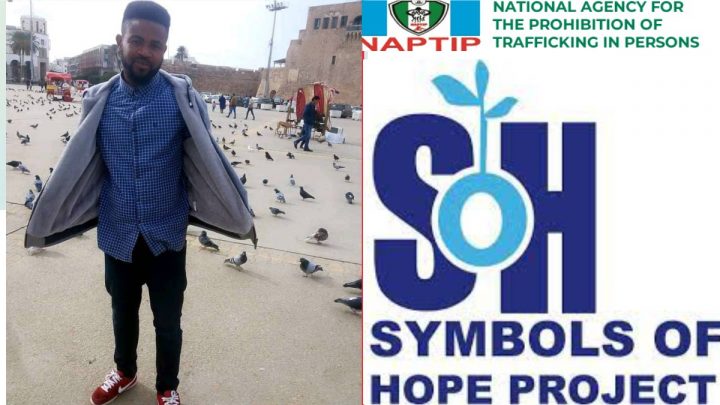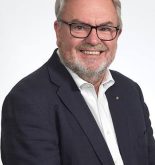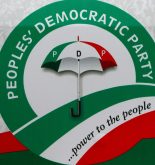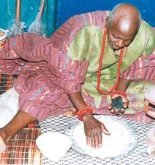By Amarachukwu Nwanguma
Epilogue: In the first part of this series, our correspondent reported how human trafficking and forced labor were the unintended consequences of a trip to Italy by a husband and wife who were tricked by a distant relative into thinking they were going for a better life and new opportunities. In this concluding part, we see the husband’s struggles and his eventual reunion with his wife and family and the associated stigma.
Obinna becomes a slave in Saba
Obinna was not as fortunate as his wife Azuka, who was bought by a less cruel family.
The smugglers sold him to Mudi, an Arab slave dealer who transported him and his other hostages to Saba, Libya.
Mudi, as a joke, demanded that each slave pay him 2,000 dinars (N200,000) before regaining their freedom.
“At first l thought he was joking, and I told him that Mr. Razaq had paid for my trip to Libya. He told me he was concerned about his money and was merely giving us a day of grace because we just arrived but warned that we should make his money available the next day,” recalled Obinna.
“When he turned up the next day and asked for his money and no one was able to pay, he brought out a gun and shot Jagaban, a boy from Edo State and he died instantly.
“I started crying like a baby and pleading that he should spare my life. Mr. Mudi gave us his phone to contact our families immediately or face his wrath.”
Again, Obinna said that he called his sister, Uju, and begged her to raise the money as fast as possible so that he would not be killed.
While waiting for the ransom to be paid, Obinna said Mr. Mudi and his aides beat the slaves with cutlasses, cables, and sticks to the extent where one of them went insane after being hit in the head.
Only 10 of the 17 people who were sold to Mr. Mudi were still alive at the time Obinna escaped in September of the same year.
When his sister, Uju paid up and he was called out to be freed, it was found that his friend Jubril, who was still waiting for his family to pay, had escaped.
Obinna said he was dragged back into the torture house and ordered to pay for Jubril.
While he cried for mercy amidst beatings and hunger, his captors only increased his torture until on October 1, 2016, when he finally escaped.
“Having been indoors for over three months without seeing the sky, I couldn’t see well when I came out and didn’t even know where to go.
“As I was wandering about the streets, I saw a black man and ran to him. I narrated my ordeal and pleaded for assistance. After giving me his phone to contact my family in Nigeria, he advised me to leave Saba because my boss will come looking for me,” Obinna recalled.
The good-hearted man, he added, advised him to go to Tripoli, which was deemed to be relatively safe and free of kidnappings.
His sister, Uju, once again paid an equivalent of N50,000, which was used by a Gambian to facilitate his trip to Tripoli.
The struggle continues
To avoid being traced by his former boss, Obinna’s Gambian guide advised him to change his name before leaving Saba, and he promptly picked Jimmy South as his new name.
It took six days to cross the desert to Tripoli, when the trip should have only taken three hours.
He was dropped off in a crowded motor park, where he began looking for shelter until he was arrested and detained by police.
After three days, when no one showed up to bail him out, the police released him into the streets, where he met Ejike, a fellow Nigerian who recruited him into his car washing business.
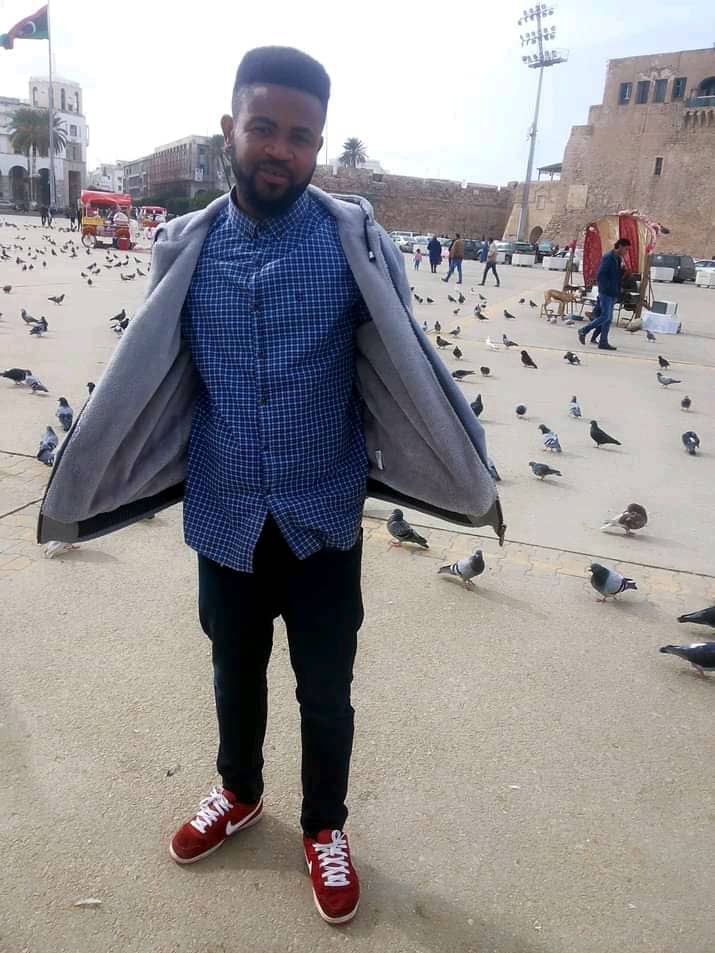
He worked at the car wash from October to December 2016 to save money to travel to Italy across the Mediterranean Sea, but Ejike advised him to wait until March when the sea calms down.
Obinna boarded the Lampalampa (local boat) in March 2017 to cross the Mediterranean Sea after discovering that several of his friends had already arrived in Italy against Ejike’s advice in January 2017.
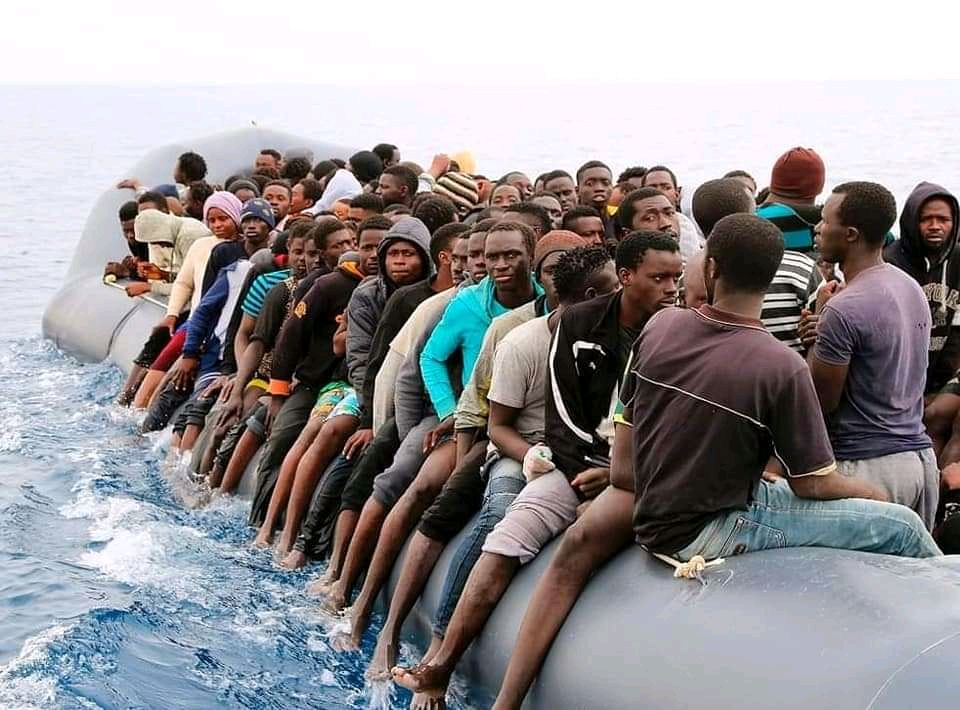
Shortly after the boat set sail, a police patrol team caught up with them and discovered hard drugs on one of the migrants during a routine search.
They were apprehended and sent to the Tareq Ashooq Detention Center in Saladin, Libya.
He was held without charge for five months until a guard asked if we would work for a Libyan woman, who wanted a housekeeper.
On August 24, 2017, he was introduced to a middle-class Libyan woman who eventually took advantage of him.
“I used to sleep in a school owned by Mama as we used to call her. The name of the school is Sahara al-Safin in Anzara Diplomacy,” Obinna recalled.
“Most times very late at night, Mama will wake me up to come and clean the house. At times it will be toilet, other time it will be to wash the rug or her undies and so many other things.
“It got to a time when she insisted that I sleep with her daily. I reminded her that I am a married man and from where I come from, it is a taboo to sleep with another man’s wife.
“She threatened to send me back to prison and got some policemen and to beat me up mercilessly. I obliged to her sexual advances until I got fed-up and started plotting my escape,” Obinna lamented.
A colleague in the school provided him a phone, and he contacted his wife on Facebook for the first time since they were separated by traffickers.
He also used the opportunity to contact some of his Tripoli friends and they helped him flee Mama’s house.
On arrival in Tripoli, Obinna’s friends warn him that Mama is well-connected and might come for him, encouraging him to flee to Italy.
They gave him 1000 dinars and connected him with a smuggler to help him escape Tripoli.
He then went to Zuwara, a coastal Libyan town two hours from Italy across the Mediterranean Sea.
On November 17, 2017, Obinna boarded the Lamalampa for a second attempt to reach Italy by sea.
After nearly four hours at sea, the boat, which was meant to carry 80 passengers but loaded with 156, was cruising towards Tunis when the engine caught fire and hurled its passengers into the furious sea.
“The boat, which was built for 80 passengers was carrying 156 and broke into two at mid sea. I saw fire all over my body and people were jumping into the sea. Many people drowned. I can’t explain how l got to the land,” he recalled.
The 87 persons who survived the boat accident walked for four days over the desert to reach Tejulu to evade arrest.
They were fortunate to meet a Gambian who drove them to his workshop and then assisted them to board a bus to Tripoli.
Nostalgia of home
After two years of pain, hunger, arrests, and failure to reach Italy, Obinna remembered home. He began to prepare to return to Nigeria.
However, his Tripoli friends said that there was no direct flight from Libya to Nigeria, except for the IOM’s (International Organisation on Migration) deportation flight.
He went to the Nigerian Embassy in Tripoli for the first time in November 2017 and applied for repatriation.
When he waited until February 2018 and received no response from the embassy, his concern mounted, and he decided to enter Italy by sea for the third time.
Twist of fate
Obinna said that he had saved some money and was ready to travel to Italy, but the police invaded their camp in Zuwara, Libya, the night that he was to leave.
He was arrested and taken to Libya’s Zawiya State’s Osama Prison, where many people were tortured and killed, and their organs were harvested and sold every day.
“Every day, somebody must be butchered like a cow with parts of his body like kidney, liver, heart, male organ separated and sold to organ merchants who were always coming around,” he recalled with unease.
“At a point, the prison was so overcrowded and needed decongesting. I was lucky to be among those transferred to another prison in Zintan. I was kept there for two months. I now speak Arabic fluently, after spending over ten months in different prisons.”
Obinna said that by an inexplicable stroke of fate, he was appointed as one of the prison warden’s aides and was tasked with delivering food, clothing, and other supplies to fellow prisoners.
Even with his new status, he was dissatisfied and finally applied for deportation in May 2018.
He was one of 160 Nigerians sent home a month later, out of over 300 people on the deportation list.
Home at last
On June 5, 2018, Obinna returned to Nigeria with the deportation flight made available by the IOM.
They were welcomed by the late T B Joshua of Synagogue Church of All Nations when they arrived.
The church, according to Obinna, asked them to tell the world, particularly potential migrants, about the dangers and misery of illegal migration.
According to him, late TB Joshua at the time provided them with funds to assist them in starting over.
“I quickly called my wife from Murtala Muhammed International Airport Lagos when we arrived, and we wept over the phone remembering all that we passed through.
“She encouraged me to come down to Abuja and join her and the kids as she has saved some money from her job.
“I also called my mother and pleaded for forgiveness. My mother was happy hearing my voice and joined a night bus from where we resided in Suleja, Niger State in Nigeria’s North-central region to meet me in Lagos where TB Joshua gave us shelter,” Obinna reminisced.
Obinna hid from family and friends and spent most of his time indoors due to embarrassment and disgrace, particularly from those who witnessed his homecoming on Emmanuel TV.
Apart from the numerous discouraging texts and phone calls he received, many derided him as a hopeless failure.
Today, he and other returnee migrants in Abuja have formed an advocacy group called “Migrants Lives Matter” and are using it as a platform to educate people about irregular migration and human trafficking.
Why people embark on irregular migration
The National Agency for the Prohibition of Trafficking in Persons (NAPTIP) in Nigeria attributes irregular migration to a lack of education and poverty.
In an interview with our correspondent, NAPTIP’s Director of Public Enlightenment, Josiah Emereole, said greed, peer pressure, and globalisation push many young people to take to unusual migration.
“The pull and push of these continuous crimes are greed, peer pressure, globalization and the power of foreign currency,” Mr. Emereole said.
He urged young Nigerians not to be tricked into travelling to any nation with the promise of a better life or job opportunity without first checking with the relevant government officials.
Julie Okah-Donli, a former NAPTIP Director and Chairperson of the United Nations Voluntary Trust Fund for Victims of Trafficking in Persons (UNVTF), maintained that irregular migration and human trafficking can only be tackled collaboratively.
She called on civil society organisations, faith-based organisations, and non-governmental organisations to assist the government to prevent irregular migration and human trafficking.
“It is a fight that should involve the whole society, the government at all levels, from local to state and the federal. Civil societies, religious bodies and NGO’s have a role to play and must compliment the efforts of the federal government.
“The issue of irregular migration and human trafficking are phenomena that affect everyone, and they need to be tackled urgently and with keen interest.”
The Lutheran Church of Christ in Nigeria, through its NGO, “Symbols of Hope Project” has been involved on issues regarding Human Trafficking and Irregular Migration since 2017.
The group has supported no fewer than 400 returned migrants from different parts of Nigeria through skills acquisition, startup grant and materials, psychological services and awareness creation.
The Country Director Rev Emmanuel Gabriel started that returned migrants have peculiar characteristics of being withdrawn and aggressive to people.
“Continuous monitoring and evaluation will go a long way in rehabilitating and reintegrating the returned migrants and providing them with psycho-social support,” he said.

